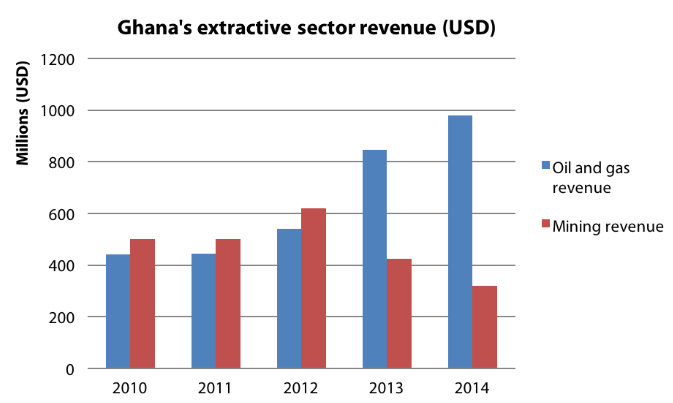
“One who climbs a good tree, gets a good push”.
In Ghana, our elders refer to this proverb to garner support for continuity of progress.
Ghana has made significant strides in extractive industry governance, despite the numerous challenges it faces as a resource-rich country. Nonetheless, there is room for improvement. As the new government assumes office today, unmasking the real owners of extractive companies will remain key in the government’s quest to curb corruption.
#Onaapo: The Black Star of Africa, the beacon of Africa’s democracy
Growing up in Ghana, I never witnessed my country oust a sitting president after his first term of office, with the bullets of the thumb. Since the era of electoral democratic dispensation in 1992, all presidents have served two terms, making this election the first of its kind in the history of the country.
7 December 2016: in some communities, the old and the young had already begun to queue as early as 2 am with a single purpose - to decide their future. It took two days of anxiety, fear and resilience after the end of voting until the electoral commission officially declared the opposition leader, Nana Addo Danquah Akufo-Addo, and the New Patriotic Party (NPP) as the President-elect. Per the Electoral Commission’s statistics, the main opposition won by 53.85% votes against 44.40% by the incumbent National Democratic Congress (NDC), in what has been regarded as a landslide victory. Unlike other elections in the region, a transitional team was quickly set up and power has been peacefully handed over to the next government. As the new government is ushered in today, the Black Star of Africa has proven yet again why it is regarded the beacon of Africa’s democracy.
As a Ghanaian, it is on this hinge of hope that I write this piece: to reinvigorate attention on the importance of transparency in the fight against corruption in the extractive industry, the work of the EITI in Ghana, and most importantly, a key pointer the new government should consider in the quest for good governance in the extractive sector. But first, let’s have a look at Ghana’s extractive industry overview.
Ghana’s extractive industry
Historically Ghana is a mining country. With substantial reserves, it is the second largest gold producer in Africa. After the discovery of oil in 2007, oil production started in 2011 and as of 2013 oil revenues have surpassed mining revenues. In 2014, extractive revenue reached a record high of USD 1.3 billion. Current estimates rate the extractive industry’s contributions to be 50% of exports, 10 % of GDP and 17.5 % of government revenue.

Since 2013, oil revenues have surpassed mining receipts.
#YeSiSem: Change has come; now change is expected.
The change in government and the new trend in the Ghanaian elections highlight two interrelated realities. First, the majority of the people of Ghana voted out a sitting president based on substantive issues, mainly perceptions of corruption and unfulfilled expectations from the failed promise of oil. Secondly, this means much more will be expected of the incoming government within the next four years.
Expectedly, corruption and the oil and gas industry, among other issues, formed the core of the 2016 elections as evident in the manifestos of most of the political parties. This is where the work of the EITI, as a transparency standard, continues to assist governments in building strong institution not only to tackle corruption but to also manage resources sustainably. In this regard, beneficial ownership disclosure requires significant attention.
Unmasking real owners of companies
Last year, the Panama Papers made an unprecedented exposure of more than 11.5 million financial and legal records revealing an opaque system upon which corruption and wrongdoing flourish. This gave an important impetus for the EITI and other stakeholders to increase efforts towards ending anonymity in extractive businesses. This transparency initiative, beneficial ownership, begs a simple question: how can the public know the individuals who ultimately control or profit from companies in the extractive sector? Without clear disclosure of beneficial owner, company anonymity allows corrupt politicians and private profiteers to hide behind companies whilst engaging in dodgy deals and illegal acts such as money laundering and tax evasion.
Our elders also say “a fish that is rotten, rots from the head”
The result of anonymous corruption is the loss of huge revenue meant to develop resource-rich but low-income countries. The EITI’s beneficial ownership disclosure can help turn outrage into change.
"National governments have to act too by making their finances transparent. They also need to ensure that all companies operating in their countries are open about who ultimately owns their business."
EITI Chair, Fredrik Reinfeldt
Ghana’s commitments and efforts so far.
The 2016 EITI Standard encourages all implementing countries to establish a public beneficial ownership (BO) disclosure regime by January 2020 (Requirement 2.5). The previous government committed to both the EITI and the OGP to the disclosure of beneficial owners at the 2016 London Anti-Corruption Summit (overview of London Summit commitments).
In August 2016, Ghana’s Companies Act was amended to include the disclosure of beneficial owners of all companies operating in the country in a public register. In simple terms, this means companies who bid for, invest or operate within the extractive sector (mining, oil and gas) in Ghana will be mandated by the Registrar General’s Department to provide the details of the real/ultimate owners of the companies. The passing of the Companies (Amendment) Act 2016 (Act 920) has provided the much needed legal basis, paving the way for the implementation of a beneficial ownership disclosure regime in Ghana. Now it’s time to actually walk the walk.
But what’s the big deal?
By making the public aware of who really owns what in the oil and gas and mining sectors, beneficial ownership disclosure exposes corrupt people who hide behind oil, gas and mining companies while engaging in illegal businesses. This would, in turn, help to prevent illicit financial flows, money laundering and tax evasion within the extractive sector. It may also minimise the risks of financing of terrorism and organized crime. In a nutshell, by providing for beneficial ownership disclosure for all registered companies, the frontiers of trust, transparency and good governance of which Ghana is known for, are further espoused.
Revisiting the promises
During his campaign, Nana Addo Danquah Akufo-Addo pledged support for the establishment of a 'Beneficial Ownership Register' to address corruption. Additionally, the 2016 NPP manifesto clearly “commits to a transparent, accountable and efficient management of the country’s petroleum resources for the benefit of all Ghanaians”.
The new government could use the EITI as a platform to facilitate the actual implementation of disclosing the real owners of companies in the extractive industry in Ghana. In March-April 2016, Ghana EITI undertook a series of consultations and has produced a report on the future of beneficial ownership transparency. More recently, Ghana EITI, like other EITI countries, has prepared a comprehensive roadmap for beneficial ownership disclosure until 2020. The aforementioned are commendable steps that needs further high-level push.
As our elders in Ghana say, “one who climbs a good tree, gets a good push”.
The talk has been talked, now let’s walk the walk.
Ghana has made significant strides in extractive industry governance. Nonetheless, there is room for improvement. As the new government assumes office today, the Black Star has a new opportunity, a new bridge and a new vim to strengthen the extractive industry governance. Unmasking the real owners of extractive companies will remain key in the government’s quest to curb corruption.
Notes
#Onaapo: is used in this context as a symbol of Ghana’s political majority and democratic consolidation. Originally, it is a title of a popular campaign song for the NDC party during the elections. The NPP supporters adopted the song as their victory song, dancing to it with other members from all political parties. Thus, a sense of unity in diversity in Ghana.
#YeSiSem: is a Twi word in Ghana meaning we are changing. It was used by members of oppositions parties as a call for change in government.
Edwin Warden supports the Communications and Anglophone Africa teams as an intern at the International Secretariat. Email: ewarden@eiti.org
Read the Ghana EITI roadmap for beneficial ownership disclosure, the Ghana EITI 2014 Oil and Gas Report and the 2014 Mining Report.
For more information about extractive transparency in Ghana, see Ghana’s EITI website or visit the country page on eiti.org. Read about beneficial ownership


